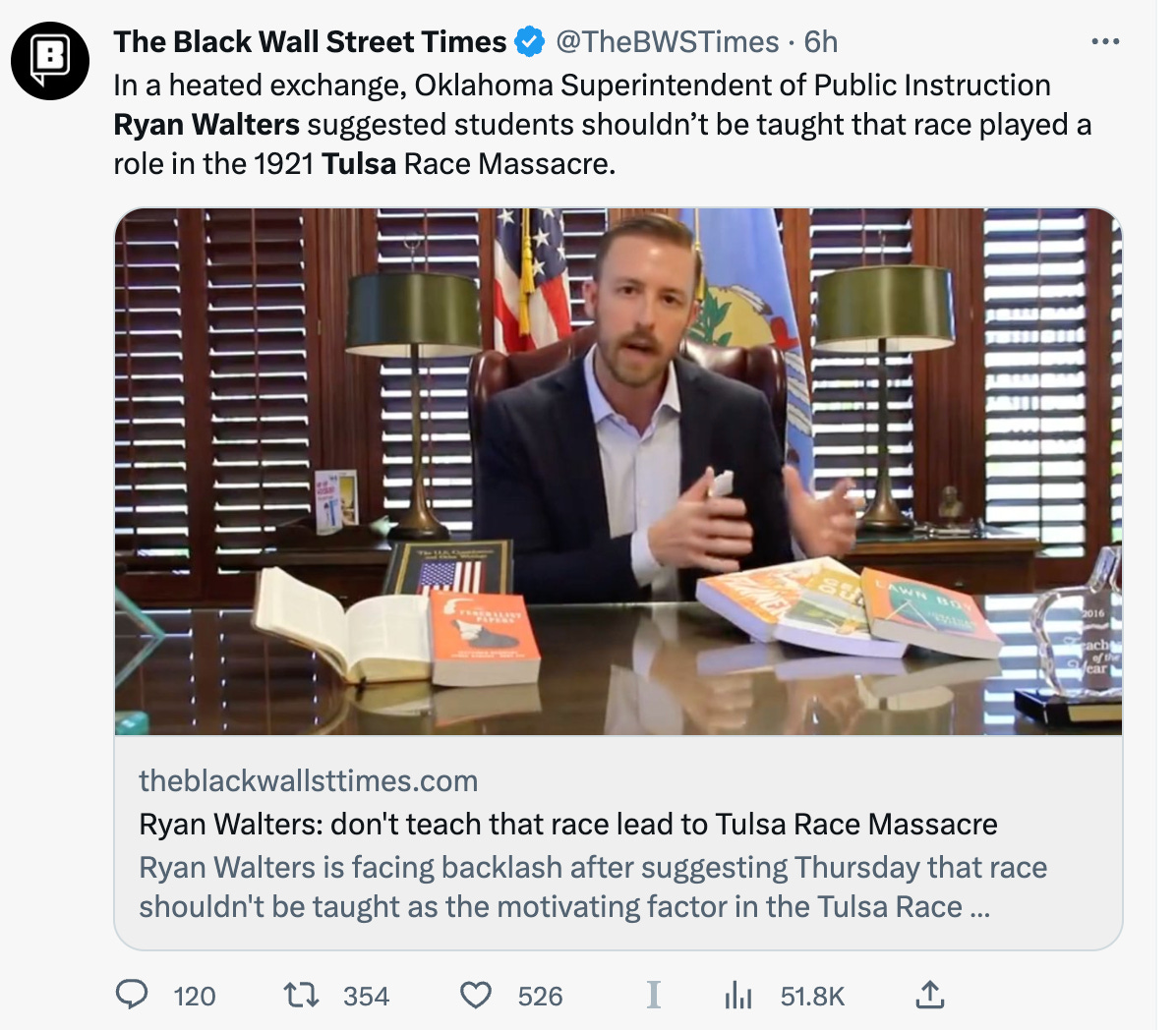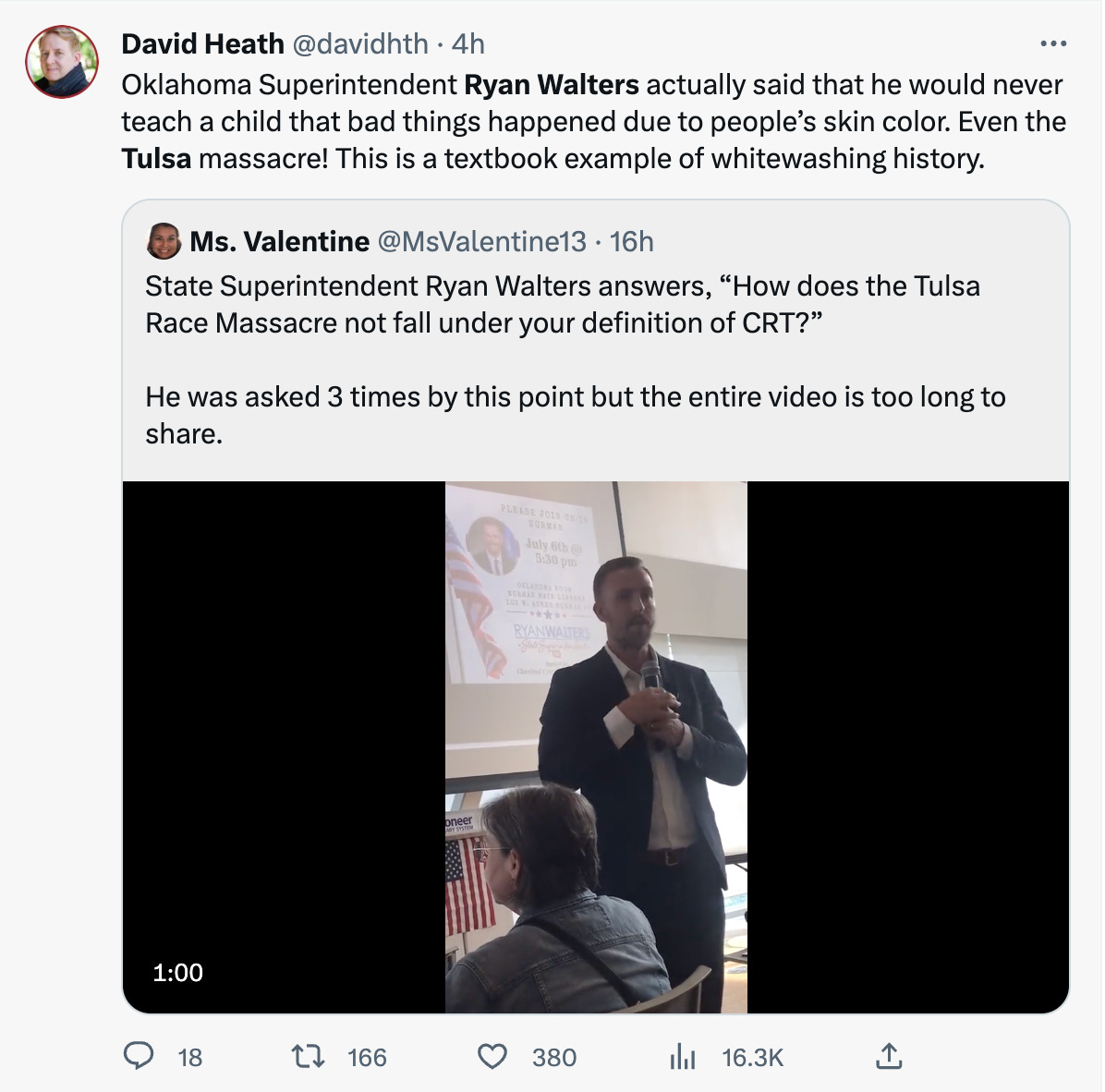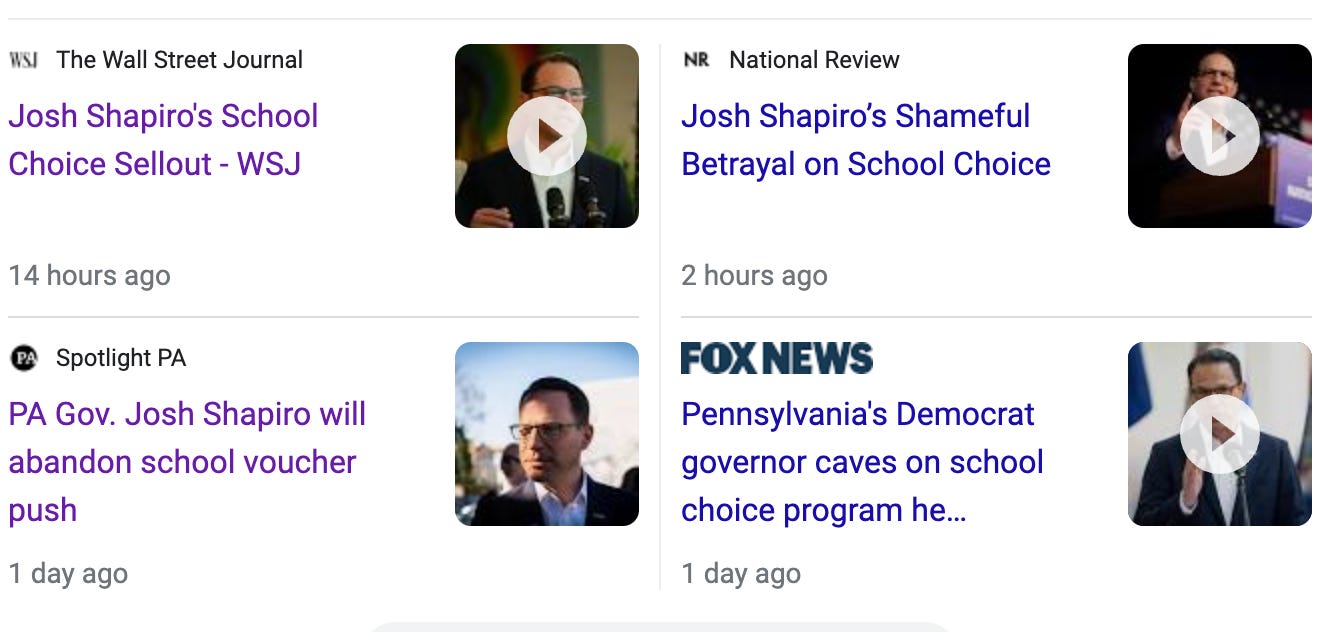Friends,
We made it through another week. Good for us.
I’m heading to New Orleans to engage hundreds of school board members from across the country. I’m speaking on a panel tomorrow about storytelling for social justice, one of my favorite things to discuss (besides food, tech, and Prince).
So, before we depart, here are some bits and pieces to chew on.
First, of course I need to plug this episode of Freedom Friday with Sharif El-Mekki. It’s our classroom, followed mostly by educators. What better place to have a tough discussion about the state of relations between Asian and Blacks.
And, second, I need to plug (again) this interesting conversation with Robert Enlow about Education Savings Accounts.
BLACKGPT: Allen Antoine, M.Ed. is Director of Computer Science Education Strategy at UT Austin’s Texas Advanced Computing Center (TACC), where he provides leadership in Computer Science education to manage rapidly expanding diversity, equity, and inclusion. In a piece from last January, he talks about the results of asking ChatGPT, “Why African American students should learn about artificial intelligence?”
Here are the five important reasons that came from the robots:
VERBATIM: I asked this optimized language model to respond to the question of why African American students should learn about artificial intelligence and it gave five important reasons. The arguments that were listed included career opportunities, addressing societal issues, representation, future impact, and personal empowerment. Let’s expand upon each of these ideas:
Career Opportunities: The machine learning job market is currently booming and there is every indication that this trend will continue. If Black students are given equal opportunities to learn about artificial intelligence, they will be better suited to pursue careers in the field. With the average salary for artificial intelligence programmers being in the six-figure range and black workers being overrepresented in low-wage jobs, exposing students to career tracks in AI can positively impact their prospects of financial success in their careers.
Addressing Societal Issues: When artificial intelligence is paired with social work, there is the potential to unlock social justice advancements that previously haven’t been considered. The USC Center for AI in Society contends that by integrating AI into initiatives that aim to promote social justice, we can generate data-driven insights to promote substantial change in outreach, advocacy, and policymaking.
Representation: People of color, especially African Americans, are currently underrepresented in the field of artificial intelligence. This is huge problem because the unique perspectives of Black people are often not considered when new technologies are being developed and tested. It is well documented that facial recognition software and light sensors, in devices like Apple watches and pulse oximeters, have been shown to be inaccurate for darker-skinned individuals; causing issues in healthcare outcomes and having egregious legal ramifications for people of color. If nothing else, having more Black programmers working in the field of artificial intelligence will allow them to voice and address these inequities.
Future Impact: As mentioned previously, the technologies of the future will definitely use artificial intelligence. Whether we are discussing transportation, education, or healthcare, AI will continue to improve existing systems that influence our day-to-day lives. It is well documented that the African American community experiences inequities in many of the aforementioned systems, therefore having Black students participate in creating these emerging technologies will positively impact margnalized Black communities.
Personal Empowerment: Learning to code machine learning algorithms can empower African American students to understand and shape the future. It allows them to write the programs that will influence their everyday lives, rather than being written off as nonessential passengers in the world that is to come. The skills needed to be successful in this field can also assist in developing problem-solving, critical thinking and technical skills which are transferable to any career they may choose to pursue.
See the full piece. [CSTA]
I WILL ALWAYS LOVE YOU: Can we agree that Dolly Parton is a national treasure? Her philanthropy goes far beyond celebrity dabbling. Imagination Library Celebrates 200 Millionth Book Milestone. VERBATIM: “Dolly Parton’s Imagination Library is turning over a new chapter in The Imagination Library legacy - celebrating 200 million books gifted globally since its inception in 1995. The early childhood book-gifting program mails a high-quality, free book each month to children from birth to age five and is now excited to celebrate with every child/family enrolled in the program and its Local Program Partners.” #TheRevolutionWillBeLiterate [Imagination Library]
COMMUNITY COLLEGES: Every day, I hear good news about community colleges that makes me think we aren’t seeing how under-utilized they are. Like this from Ohio, VERBATIM: Three community colleges in Ohio increased their graduation rates by 50% over the past six years under a new program called Accelerated Study in Associate Programs. The program helps low-income families and provides career services, a tuition waiver, and financial assistance for transportation and textbooks. The upside: earnings of participants increased by 11%, compared with a control group. [SCENE]
PUBLIC MEANS PUBLIC: North Carolina’s Democratic governor vetoed a bill that would have moved the power to approve charter schools from the State Board of Education to a charter review board. The problem is that charters often face hostility from traditional education bodies. Great schools are rejected, and educators' work to thoughtfully create new schools is wasted. The anti-charter sentiment is almost a religion for public school purists. So, on the face, this veto is a loss for those who support charters. On the other hand, while blocking the transfer of charter authorizing power, the governor pointed out that charter schools are included in public schools and that public bodies govern public schools. That’s a slight win. VERBATIM: “The North Carolina Constitution clearly gives the State Board of Education the oversight authority for public schools, including charter schools,” Cooper, a Democrat, said in his veto message. “This bill is a legislative power grab that turns that responsibility over to a commission of political friends and extremists appointed by Republican legislators, making it more likely that faulty or failing charter schools will be allowed to operate and shortchange their students. “Oversight of charter schools should be conducted by education experts not partisan politicians.” #Charters [The Charlotte Observer]
400 YEARS: Do you want to see an eye-popping headline? Here it is: “Tony Evers uses veto powers to extend annual increases for public schools for the next four centuries.” Wisconsin’s governor did some unexpected editing magic to reshape the budget sent to him. Republicans wanted a huge tax cut for the wealthy. Democrats wanted to fund schools. They both got a little of what they wanted. Will any of it make a difference for Wisconsins seriously uneven educational outcomes? Probably not. None of it is tied to hard measures of “what works” in education. But, we have to admit, it makes for great theater. #SneakyBlue [Milwaukee Journal Sentinal]
BLACK BELT SCHOOLS: It’s fashionable to summarily discount the existence of systemic racism, especially if you benefit from it and have never been the victim of it. Yet, education is overbaked with example after example of the phenomena. Enter a report by Stephen J. Owens, Ph.D shows how communities in Georgia’s Black Belt are systematically disadvantaged compared to the rest of the state. VERBATIM: “Students in the Black Belt are offered significantly fewer opportunities than their peers in the rest of the state of Georgia. Black Belt students are 21 percent more likely to be taught by teachers with fewer than four years of experience, with 35 percent inexperienced outside the region and 42 percent in the Black Belt. These same children are 28 percent more likely to have teachers that are teaching “out-of-field,” meaning they are not teaching the subject in which they are licensed or certified: 10 percent in the Black Belt compared to 7.6 percent in the rest of the state. These differences can have dramatic effects on student outcomes. Teachers’ experience and credentials significantly influence student grades and future educational attainment. While the average school district outside the Black Belt offers 12 Advanced Placement (AP) courses, districts in the Black Belt average seven courses. Fifteen school districts in the Black Belt, serving 12,700 students, did not have a single student take an AP test in 2018. The Georgia Department of Education records the number of 12th-grade students that earn credit for “accelerated enrollment” via Dual Enrollment, AP or International Baccalaureate courses and score the results from 1-100. Black Belt districts average an 85.7, while those outside the region score a 94.5. Challenging classes can provide a first exposure to schooling beyond high school graduation. Evidence shows that the lack of access to rigorous coursework in high school hurts students later in college.” #Outcomes [GBPI]
ERASING RACE: The Right seems to be testing a trial balloon with white Americans to see if they are ready to move on from feeling guilty about the country’s mistreatment of racial minorities. Haven’t we talked about it long enough? Haven’t we heard enough about racism and all that? Scientific American has a piece describing the broad effort to give the country a mind eraser.
VERBATIM: The Students for Fair Admissions cases against Harvard University and the University of North Carolina (UNC) are pieces of a larger movement to quell all discussion of racism across the country. These pieces exist in a patchwork quilt that includes Florida’s Stop WOKE Act, which tries to curtail discussions of racism and sexism at public colleges, Texas’s Senate Bill 17, which bans diversity, equity and inclusion efforts, and others. As a Texas-based professor of higher education policy who has previously worked in admissions, I have been keenly interested in following these maneuvers. Yet all college and university stakeholders should care, given that these developments could have drastic effects on the entire system of higher education in the U.S.
These legislative and legal actions in higher education join broader actions, such as the 2013 Supreme Court case that dismantled key portions of the Voting Rights Act, in describing a country that no longer needs interventions to combat white supremacy. Each presumes there is no need to implement purposeful policy to correct historical wrongs or to advocate for more equity because we have already accomplished our goals. [Scientific American]
POTUS ON SCOTUS: Here’s the official position of President Biden regarding the Affirmative Action ruling. VERBATIM: “Today’s Supreme Court decision takes our country decades backward, sharply limiting a vital tool that colleges have used to create vibrant, diverse campus communities,” added the Secretary in his own statement. “Students of color have long faced inequities in education and college access, and today’s ruling is yet another blow to the fight for equal opportunity…. I want to send a message to all aspiring students, especially Black, Latino, Asian American, Native American, Alaska Native, Native Hawaiian, Pacific Islander, and other students from underserved communities: we see you, and we need you. Do not let this ruling deter you from pursuing your educational potential. Our colleges and country itself cannot thrive and compete in the 21st century without your talent, ingenuity, perseverance, and ambition. [And] to our higher education leaders: now is not the time to lessen your commitment to campus communities that reflect the rich diversity of this nation, which enhance the college experience in myriad ways and prepare students from all walks of life to live, work, and lead our democracy together. Your leadership and commitment to ensuring our institutions reflect the vast and rich diversity of our people are needed now more than ever.”
ERASING RACE II: Oklahoma’s anti-CRT State Supt. of Educations got tripped up at a gathering when he asked how teachers can teach about the Tulsa without talking about race. [Twitter]
GOD AT SCHOOL:
Missouri public schools will be allowed to offer elective courses on the Bible under a new law signed by Republican Gov. Mike Parson this week. [Kansas City Star]
A suburban school district in Utah has banned the Bible in elementary and middle schools after a parent frustrated by efforts to ban materials from schools argued that some Bible verses were too vulgar or violent for younger children. And the Book of Mormon could be next. [CBS News]
Florida’s state education department rejected two new Holocaust-focused textbooks for classroom use, while forcing at least one other textbook to alter a passage about the Hebrew Bible in order to meet state approval. [Jewish Telegraphic Agency]
UNPUBLIC EDUCATION: For about $4,000 a year, you can get a private school education at Jacksonville Christian School in North Carolina. That’s more than reasonable. There’s one catch. Justin Parmenter, an NC educator, says that even though the school takes public money, they have very unpublic rules. Your child can be expelled if they ever admit to being gay. If parents switch churches or become "uncooperative and disgruntled," they get the boot. And here’s one I’ve never seen: VERBATIM: “When students at JCA misbehave, a parent will be summoned to the school to paddle the child. If the parent is unavailable they can give beating permission to the principal. If the parent refuses the punishment their child will be kicked out of the school.” The big difference between public school choice and private school choice is that the former has Civil Rights protections that can be absent in the latter. #TheyBeatChildren [Justin Parmenter]
THEY’RE BIG MAD: Pennsylvania Governor Josh Shapiro seemed primed to give right-wing school choice folks a win they would crow about in every funding meeting. A Democratic governor crossing partisan lines to create a (modest) private school voucher program. Alas, he changed his mind at the 11th hour to get a budget passed, and the right wing melted down on social media.
See here:
Well, that’s all I got for the this week. Let’s talk next week.
Peace,
Christopher








This was a great read!